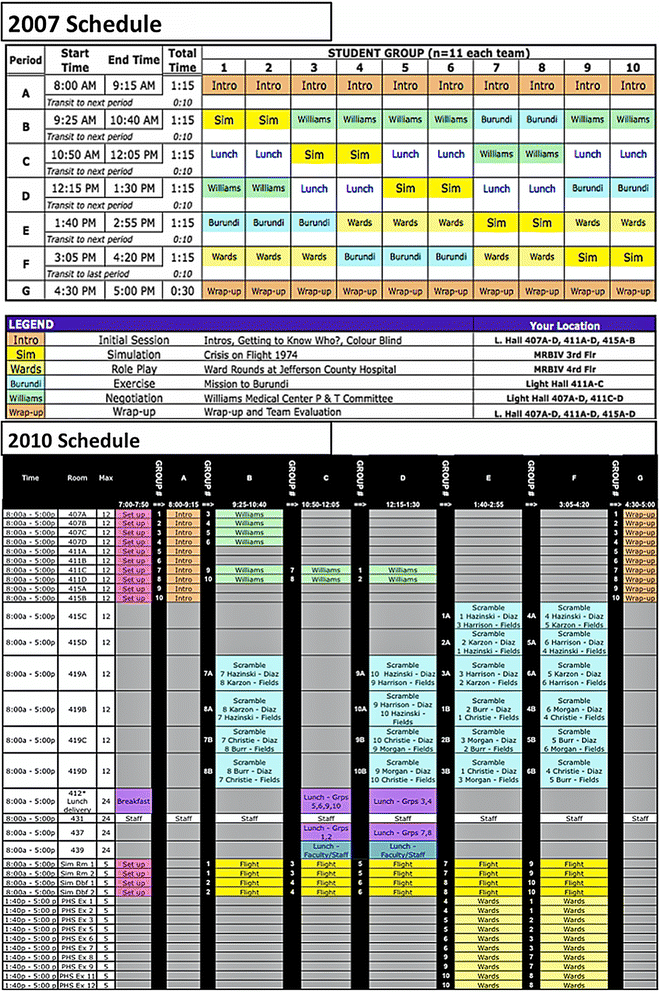A simulation-based curriculum to introduce key teamwork principles to entering medical students
- PMID: 27852293
- PMCID: PMC5112730
- DOI: 10.1186/s12909-016-0808-9
A simulation-based curriculum to introduce key teamwork principles to entering medical students
Abstract
Background: Failures of teamwork and interpersonal communication have been cited as a major patient safety issue. Although healthcare is increasingly being provided in interdisciplinary teams, medical school curricula have traditionally not explicitly included the specific knowledge, skills, attitudes, and behaviors required to function effectively as part of such teams.
Methods: As part of a new "Foundations" core course for beginning medical students that provided a two-week introduction to the most important themes in modern healthcare, a multidisciplinary team, in collaboration with the Center for Experiential Learning and Assessment, was asked to create an experiential introduction to teamwork and interpersonal communication. We designed and implemented a novel, all-day course to teach second-week medical students basic teamwork and interpersonal principles and skills using immersive simulation methods. Students' anonymous comprehensive course evaluations were collected at the end of the day. Through four years of iterative refinement based on students' course evaluations, faculty reflection, and debriefing, the course changed and matured.
Results: Four hundred twenty evaluations were collected. Course evaluations were positive with almost all questions having means and medians greater than 5 out of 7 across all 4 years. Sequential year comparisons were of greatest interest for examining the effects of year-to-year curricular improvements. Differences were not detected among any of the course evaluation questions between 2007 and 2008 except that more students in 2008 felt that the course further developed their "Decision Making Abilities" (OR 1.69, 95% CI 1.07-2.67). With extensive changes to the syllabus and debriefer selection/assignment, concomitant improvements were observed in these aspects between 2008 and 2009 (OR = 2.11, 95% CI: 1.28-3.50). Substantive improvements in specific exercises also yielded significant improvements in the evaluations of those exercises.
Conclusions: This curriculum could be valuable to other medical schools seeking to inculcate teamwork foundations in their medical school's preclinical curricula. Moreover, this curriculum can be used to facilitate teamwork principles important to inter-disciplinary, as well as uni-disciplinary, collaboration.
Keywords: Communication; Course evaluation; Curriculum development; Geriatrics education; Interpersonal skills; Iterative curriculum design; Simulation; Standardized patients; Teamwork; Undergraduate medical education.
Figures
Similar articles
-
Integration of geriatrics into a spiral undergraduate medical curriculum in Pakistan: evaluation and feedback of third-year medical students.Educ Health (Abingdon). 2011 Dec;24(3):622. Epub 2011 Dec 15. Educ Health (Abingdon). 2011. PMID: 22267358
-
Development and evaluation of a 3-day patient safety curriculum to advance knowledge, self-efficacy and system thinking among medical students.BMJ Qual Saf. 2012 May;21(5):416-22. doi: 10.1136/bmjqs-2011-000463. Epub 2012 Mar 15. BMJ Qual Saf. 2012. PMID: 22421912
-
'Thinking on my feet': an improvisation course to enhance students' confidence and responsiveness in the medical interview.Educ Prim Care. 2013 Feb;24(2):119-24. doi: 10.1080/14739879.2013.11493466. Educ Prim Care. 2013. PMID: 23498579
-
A Web-based geriatrics portfolio to document medical students' learning outcomes.Acad Med. 2002 Sep;77(9):937-8. doi: 10.1097/00001888-200209000-00043. Acad Med. 2002. PMID: 12228110 Review.
-
[Introduction of team-based learning to the pharmacy experiential practice course for first-year pharmacy students].Yakugaku Zasshi. 2014;134(2):179-83. doi: 10.1248/yakushi.13-00231-2. Yakugaku Zasshi. 2014. PMID: 24492220 Review. Japanese.
Cited by
-
Healthcare Simulation: An effective way of learning in health care.Pak J Med Sci. 2023 Jul-Aug;39(4):1185-1190. doi: 10.12669/pjms.39.4.7145. Pak J Med Sci. 2023. PMID: 37492303 Free PMC article. Review.
-
Applications of the reflective practice questionnaire in medical education.BMC Med Educ. 2019 Feb 7;19(1):47. doi: 10.1186/s12909-019-1481-6. BMC Med Educ. 2019. PMID: 30732611 Free PMC article.
-
Preparing for the National Health Service: the importance of teamwork training in the United Kingdom medical school curriculum.Adv Med Educ Pract. 2019 Aug 22;10:679-688. doi: 10.2147/AMEP.S203333. eCollection 2019. Adv Med Educ Pract. 2019. PMID: 31686942 Free PMC article.
-
Improving handover competency in preclinical medical and health professions students: establishing the reliability and construct validity of an assessment instrument.BMC Med Educ. 2021 Oct 2;21(1):518. doi: 10.1186/s12909-021-02943-x. BMC Med Educ. 2021. PMID: 34600497 Free PMC article.
-
Gender and Assigned Role Influences Medical Students´ Learning Experience in Interprofessional Team Training Simulations.MedEdPublish (2016). 2017 Feb 10;6:28. doi: 10.15694/mep.2017.000028. eCollection 2017. MedEdPublish (2016). 2017. PMID: 38406488 Free PMC article.
References
-
- Dayton E, Henriksen K. Communication failure: basic components, contributing factors, and the call for structure. Jt Comm J Qual Patient Saf. 2007;33:34–47. - PubMed
MeSH terms
LinkOut - more resources
Full Text Sources
Other Literature Sources
Medical
Research Materials


